 The Team Ethanol car driven by Jeff Simmons is out of the race after what looked like a slide coming out of a turn which turned the car around and then two other cars crashed into it. Fortunately no one was seriously hurt. In fact, they just reported that all three drivers have been assessed and released, so they’re okay.
The Team Ethanol car driven by Jeff Simmons is out of the race after what looked like a slide coming out of a turn which turned the car around and then two other cars crashed into it. Fortunately no one was seriously hurt. In fact, they just reported that all three drivers have been assessed and released, so they’re okay.
I’m going to stick it out though since no matter who wins tonight, ethanol will be the winner. So I will have some new posts tomorrow, including some interviews I did earlier this afternoon.
Remember to check out my XM Satellite Radio Indy 300 Photo Album.


 Here’s Jeff Simmons in the Ethanol Car on the opening lap of the race tonight.
Here’s Jeff Simmons in the Ethanol Car on the opening lap of the race tonight. This year the IRL is giving new meaning to the “green flag.” The official green flag has the ethanol logo.
This year the IRL is giving new meaning to the “green flag.” The official green flag has the ethanol logo.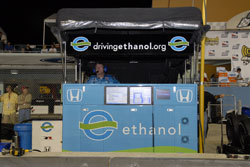 This is the command center for the Rahal-Letterman Ethanol Car seen from trackside just before the race got started. We’ve been hoping the elements would cooperate but it’s a little iffy.
This is the command center for the Rahal-Letterman Ethanol Car seen from trackside just before the race got started. We’ve been hoping the elements would cooperate but it’s a little iffy.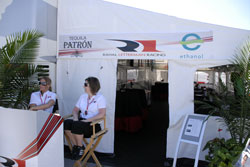 While I was conducting an interview in the Rahal-Letterman hospitality tent, the owner stopped in looking all relaxed.
While I was conducting an interview in the Rahal-Letterman hospitality tent, the owner stopped in looking all relaxed.
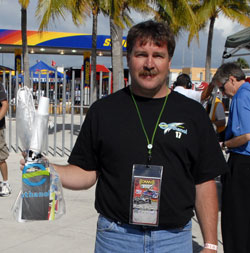 One of the newer members of the Ethanol Promotion and Information Council is
One of the newer members of the Ethanol Promotion and Information Council is 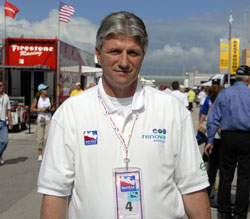 Dan Schwartzkopf here is VP of Renova Energy and attending the first IRL race of the season. Dan races himself and has been featured here on Domestic Fuel before.
Dan Schwartzkopf here is VP of Renova Energy and attending the first IRL race of the season. Dan races himself and has been featured here on Domestic Fuel before.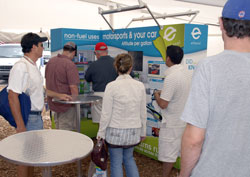 I mentioned the IRL fan zone earlier. One of the tent displays here features the mobile education center that’s being put together by EPIC.
I mentioned the IRL fan zone earlier. One of the tent displays here features the mobile education center that’s being put together by EPIC. Jeff Simmons is hanging with his buddies for real now. These are the new #17 Car, Jeff Simmons shirts. I’ll be wearing mine by racetime. We’re hoping the weather clears up. It just poured rain here. The shirts of course prominently promote the ethanol brand.
Jeff Simmons is hanging with his buddies for real now. These are the new #17 Car, Jeff Simmons shirts. I’ll be wearing mine by racetime. We’re hoping the weather clears up. It just poured rain here. The shirts of course prominently promote the ethanol brand. One of the ways that EPIC and the IRL are promoting ethanol and helping educate the public while doing so is with thousands of branded bags like these that are given away to fans at each race.
One of the ways that EPIC and the IRL are promoting ethanol and helping educate the public while doing so is with thousands of branded bags like these that are given away to fans at each race.